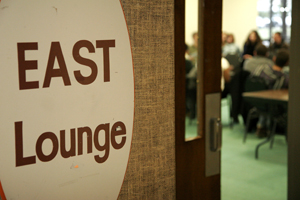
Student groups and administrators alike will be scrambling to find space next year when construction in the Old University Union will greatly reduce campus programming space. The construction, which is scheduled to begin immediately after commencement in May, is being completed to remove asbestos throughout the Union, as well as to install a new sprinkler system.
The south end of the Union, which spans from the bus stop to the Campus Life office on three floors, will be closed for the entire 2007-2008 academic year.
Although the renovations will ultimately create more available programming space on the Union’s second floor, it will put offline some of the largest sources of programming space for student groups on campus, including room 133, the Old Union Hall and the Mandela Room.
‘It’s going to be a difficult year for everybody,’ said James Koval, University Union director.
Groups like Chabad and the Asian Student Union have had difficulties finding programming space for activities in the Union, and major events like Shabbat, Purim and Barrio have no official dates.
‘There are too many events on campus this semester, and once construction starts it is just going to get worse. Groups will be searching for space and there won’t be any available,’ said Sandra Dube, vice president for university programming for the Student Association.
According to James VanVoorst, vice president for administration, the University is looking to refurbish other spaces so a ‘domino effect’ can take place.
The Alternate Space Committee has been formed to seek additional programming space that can be used during the upcoming academic year, as well as offer recommendations on which events should receive space and at what time.
Joe Danko, SA executive vice president and student representative for the ASC, said that the committee has not found many promising solutions thus far.
The East and West Gyms have been considered as programming space for larger groups, but the athletic events already scheduled in the buildings do not leave significant amounts of time for student groups to host events there. Programs in the gyms would also cost a significant amount more to keep the facilities open, as well as run the risk of damaging athletic equipment and floors.
The ASC has considered utilizing the dining halls as well, but this poses the same financial concerns associated with extending the building’s hours of operation. Using the dining halls would also severely limit the amount of time student groups were given for programming during daytime hours, a period when space for group meetings and event set-up is in high demand.
‘I am really nervous that there won’t be ample space for all of the groups next year,’ Dube said. ‘Hopefully the student groups and administration will cooperate and work something out.’
According to Danko, it will be impossible for the school to host the same number of student group events next year. This leaves the ASC to decide whether programming for certain organizations and events should take precedence over others, or if everything should be decided on a first-come, first-serve basis.
Dube added that meeting the demands of student groups is her primary concern.
‘I’m willing to put up a fight if necessary ‘ if the groups’ needs aren’t met,’ she said.


